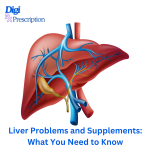
The liver plays a critical role in detoxification, metabolism, and nutrient storage. While lifestyle changes and medical treatments are foundational for liver health, certain supplements may support liver function. However, not all supplements are safe or effective, and some can even harm the liver. Below, we explore evidence-based supplements for liver health and key precautions to consider.
Supplements That May Support Liver Health
1. Milk Thistle (Silymarin)
How it works: Contains antioxidants that protect liver cells from toxins and reduce inflammation.
Benefits: May improve liver function in conditions like fatty liver disease, hepatitis, or cirrhosis.
Dose: 140–420 mg silymarin daily (standardized extract).
Caution: Avoid if allergic to ragweed; consult a doctor if taking blood thinners.
2. N-Acetylcysteine (NAC)
How it works: Boosts glutathione, a potent antioxidant that detoxifies the liver.
Benefits: Used in acetaminophen overdose treatment; may reduce oxidative stress in NAFLD.
Dose: 600–1,800 mg daily (under medical guidance).
3. Turmeric/Curcumin
How it works: Anti-inflammatory and antioxidant properties may reduce liver inflammation.
Benefits: Shows promise in managing fatty liver disease and hepatitis.
Dose: 500–2,000 mg curcumin daily (paired with black pepper for absorption).
4. Omega-3 Fatty Acids
How it works: Reduces liver fat and inflammation.
Benefits: Supports NAFLD management.
Sources: Fish oil, algae oil, or fatty fish like salmon (1–4 g daily).
5. Vitamin E
How it works: Antioxidant that protects liver cells from damage.
Benefits: May improve liver enzyme levels in non-alcoholic steatohepatitis (NASH).
Dose: 400–800 IU daily (only under medical supervision—high doses can be harmful).
6. Probiotics
How it works: Supports gut-liver axis health, reducing toxin buildup.
Benefits: May improve liver enzyme levels and reduce NAFLD progression.
Sources: Supplements or fermented foods (e.g., yogurt, kefir).
7. Artichoke Extract
How it works: Stimulates bile flow and supports detoxification.
Benefits: May reduce symptoms of indigestion and mild liver dysfunction.
Dose: 300–600 mg standardized extract daily.
8. Alpha-Lipoic Acid (ALA)
How it works: Antioxidant that regenerates glutathione and reduces oxidative stress.
Benefits: Studied in alcoholic liver disease and hepatitis.
Dose: 300–600 mg daily (consult a doctor).
Supplements to Avoid or Use with Caution
Kava: Linked to liver toxicity and failure.
Green Tea Extract (high doses): May cause liver damage in susceptible individuals.
Comfrey: Contains pyrrolizidine alkaloids, which are hepatotoxic.
Vitamin A (high doses): Can be toxic to the liver.
Unregulated "Detox" Products: Many lack evidence and may contain harmful ingredients.
Key Precautions
Consult a Doctor First: Supplements can interact with medications (e.g., blood thinners) or worsen existing conditions.
Quality Matters: Choose third-party tested supplements (look for USP, NSF, or ConsumerLab seals).
Lifestyle First: Supplements are not substitutes for a healthy diet, exercise, or avoiding alcohol.
Monitor Liver Enzymes: Regular blood tests are crucial if you have liver disease.
When Supplements Aren’t Enough
Advanced liver diseases (e.g., cirrhosis, hepatitis B/C) require medical treatment, not just supplements.
Always prioritize prescribed medications (e.g., antivirals, immunosuppressants).
References
National Institutes of Health (NIH). (2023). Milk Thistle: What You Need to Know.
Retrieved from https://www.nccih.nih.gov
Mayo Clinic. (2023). N-Acetylcysteine (NAC) and Liver Health.
Retrieved from https://www.mayoclinic.org
World Journal of Gastroenterology. (2022). Curcumin in Liver Diseases: A Systematic Review.
American Liver Foundation. (2023). Supplements and Liver Disease.
Retrieved from https://liverfoundation.org
Healthline. (2023). Best Supplements for Liver Health.
Retrieved from https://www.healthline.com
Cleveland Clinic. (2023). What to Know About Liver Detoxes.
Retrieved from https://my.clevelandclinic.org
Journal of Hepatology. (2021). Omega-3 Fatty Acids in NAFLD Management.
Disclaimer: Supplements are not regulated like medications. Always consult a healthcare provider before starting any new supplement, especially if you have liver disease or take other medications.
